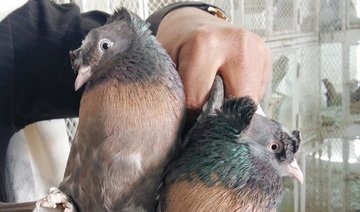RIYADH: A building that stood abandoned in Riyadh’s Al-Mughrizat District for 15 years was transformed on Nov. 15 as crowds attended its rebirth.
The annual RSH Street Art Festival, which is organized by the Saudi Ministry of Culture’s Visual Arts Commission and runs until Dec. 6, displays the work of more than 30 international, regional, and local artists, and aims to build communities around art while helping to beautify the city of Riyadh.
Basmah Felemban, co-curator of the festival, told Arab News: “The festival puts on stage the works of artists from Saudi Arabia and all over the world, and that diversity really reflects on the different flavors in the works.
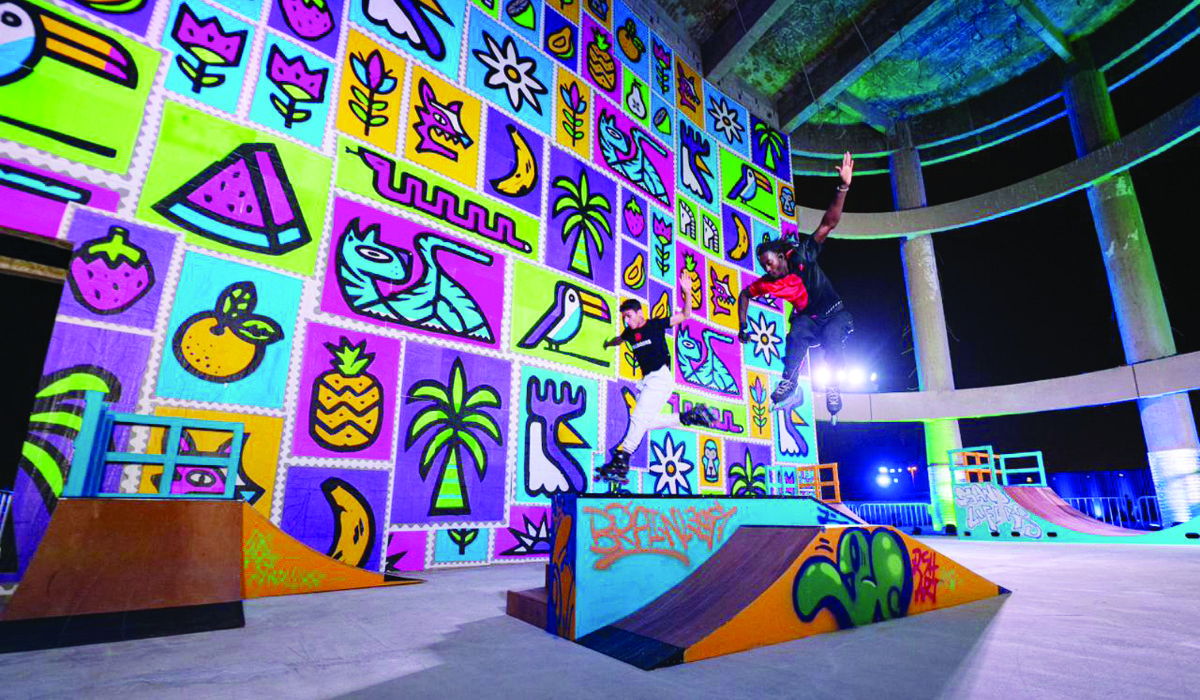
The RSH Street Art Festival displays the work of more than 30 international, regional, and local artists. Inset: The Art of the People area to unleash creativity is open to all from 7 p.m. to 9 p.m. (Supplied)
“It creates a great environment to discuss deeper questions about street art as a practice through workshops, lectures, and discussions for both curious artists and more advanced individuals and collectives.”
Two of the works, one by ST4 Collective and another by Saudi artist San Shyn, are to be repurposed and permanently relocated to Municipal Square and Sunset Park, respectively.
HIGHLIGHTS
• The RSH Street Art Festival aims to build communities around art and beautify the city of Riyadh.
• Two of the works, one by ST4 Collective and another by Saudi artist San Shyn, will be permanently relocated to Municipal Square and Sunset Park, respectively.
• Saudi artist Bolotron’s work ‘Bolotron 808 — Cyber Vision’ is a futuristic cyborg-obsessed take on the Kingdom.
Shyn said of the work: “I was inspired by the location. The park is a place for families and children to gather, play, and enjoy their time, surrounded by trees and grass. I chose colorful and vibrant flowers as the main element while the character runs in the middle.”
A large black and white collection of headshots of various members of the community hits the senses just before the entrance. The work is by the Inside Out Project, a platform that amplifies voices through public art and highlights street communities.
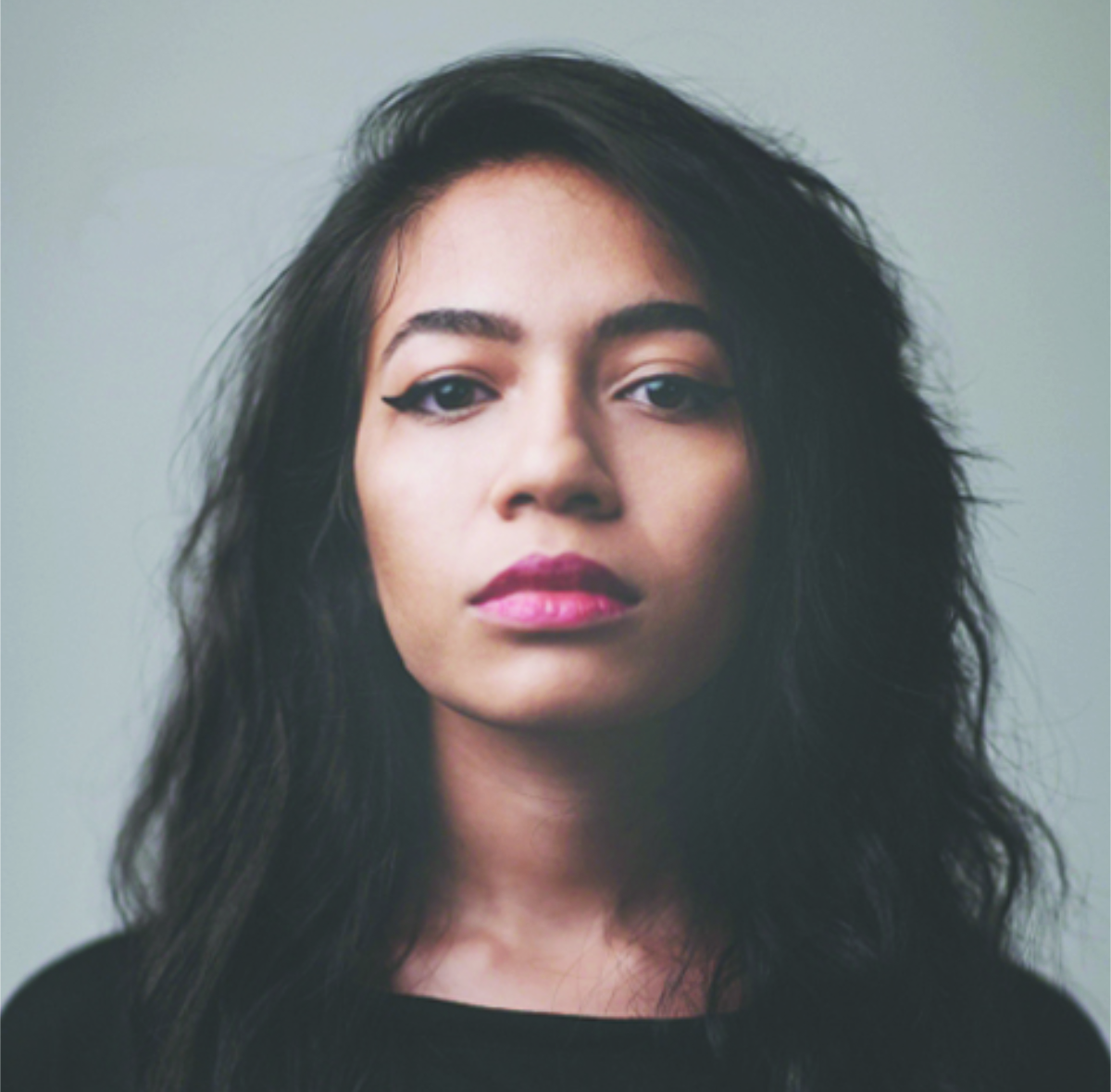
Basmah Felemban, RSH Street Art Festival co-curator
To enhance their presence in the space, visitors can listen to the experiences through testimonies and the voices of the people themselves.
Walking through the interior, Saudi artist Zainab Al-Mahoozi’s mural reels in visitors with tempting visuals of an ice cream truck. Emerging from the blacked out window is a stranger’s arm handing awaiting children the frozen dessert. She uses her dedicated space to tackle social issues, in this particular case concerning children and vulnerable members of society.
The festival puts on stage the works of artists from Saudi Arabia and all over the world, and that diversity really reflects on the different flavors in the works.
Basmah Felemban, RSH Street Art Festival co-curator
She told Arab News: “Not everything that looks outwardly pleasing is the same on the inside.
“I chose to exemplify this notion through children since they’re the most impressionable, but this also applies to everyone.”
Others choose to platform the new Saudi and its promising future. Saudi artist Bolotron’s work “Bolotron 808 — Cyber Vision” is a futuristic cyborg-obsessed take on the Kingdom, while Fouad Alghareeb showcases a Saudi Lego character running toward the 2034 World Cup in one mural and nods to the country’s first-ever car manufacturing facility in another.

The RSH Street Art Festival displays the work of more than 30 international, regional, and local artists. Inset: The Art of the People area to unleash creativity is open to all from 7 p.m. to 9 p.m. (Supplied)
Iraqi artist Wijdan Al-Majed’s “Landmarks of Iraq in Riyadh” is an impressive interpretation of an imagined space. The mural pays homage to prominent Iraqi figures and the country’s deep-rooted history and identity.
Photojournalist Martha Cooper played a pivotal role in documenting graffiti culture in the 1970s and 80s in New York City, and her collaborative 1984 book “Subway Art” has quickly become a street culture bible. A collection of her photos is displayed digitally at the festival.
Backdropping the festival’s miniature skate park is a colorfully contrasted artwork by SHN Collectivo, composed of Brazilian creatives Haroldo Paranhos, Edwardo Saretta, Marcelo Fazolin, and their crew. The silkscreen-printed neon mural features Saudi cultural elements like palm trees while also boasting tropical prints, stylized in printed letter stamps.
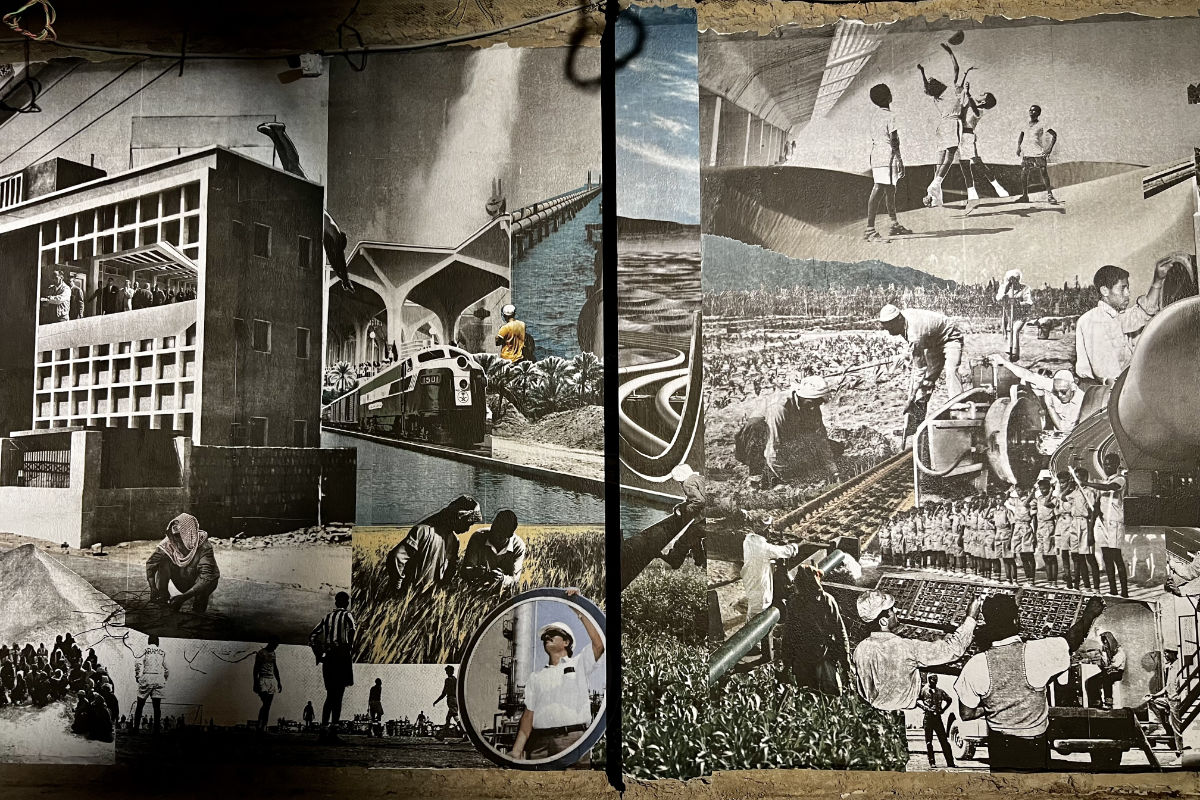
The annual RSH Street Art Festival kicked off with a bang as it displayed the work of over 30 international, regional, and local artists with an aim to build communities around the artform and beautify the city of Riyadh. (AN photo)
Ahmad Bawazeer’s RSH work is a self-portrait in which he is seen carrying a bouquet of flowers and boasting his beating red heart to surrounding faces. “I like giving out good vibes and happiness,” he told Arab News. “With all the suffering in the world, this is me just sending flowers to everyone through art.
“I think all this — skateboarding, street art, music — is part of youth culture and they all complement each other.
“In order for all of us to succeed we need to support each other and push further to become better. It’s all about boosting the culture.”
Bawazeer speaks of his early interaction with art when his mother would sketch out Street Fighter characters and he would then bring them to life with colors. To this day, characters are central to his work.
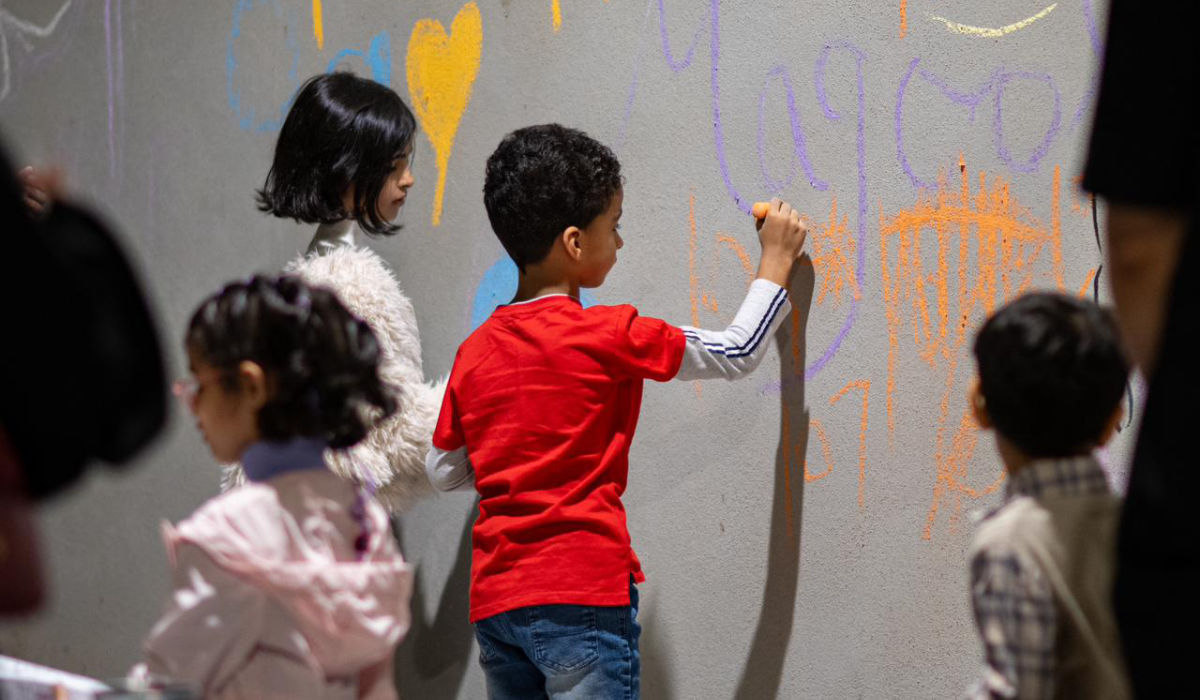
The Art of the People Area buzzed with visitors looking to unleash their creative expression with various materials, including paint and non-toxic chalk, on the building’s walls. By the end of the fest, the concrete will become a collective artwork. The zone is open to all, daily from 7 to 9pm. (Supplied)
But the event is not merely a display of captivating artworks. It works to actively educate and engage the public through workshops, lectures, street performances, skate classes, competitions, and film screenings.
The first night’s program began with a lecture from American artist Futura 2000, who was at the forefront of the early 1980s street art movement, in conversation with festival co-curator Cedar Lewisohn.
Other topics include “A Brief History of Graffiti Writing” and “The Community Mind Map,” while other discussions will be taking place throughout the month, as well as workshops for aspiring artists and children.
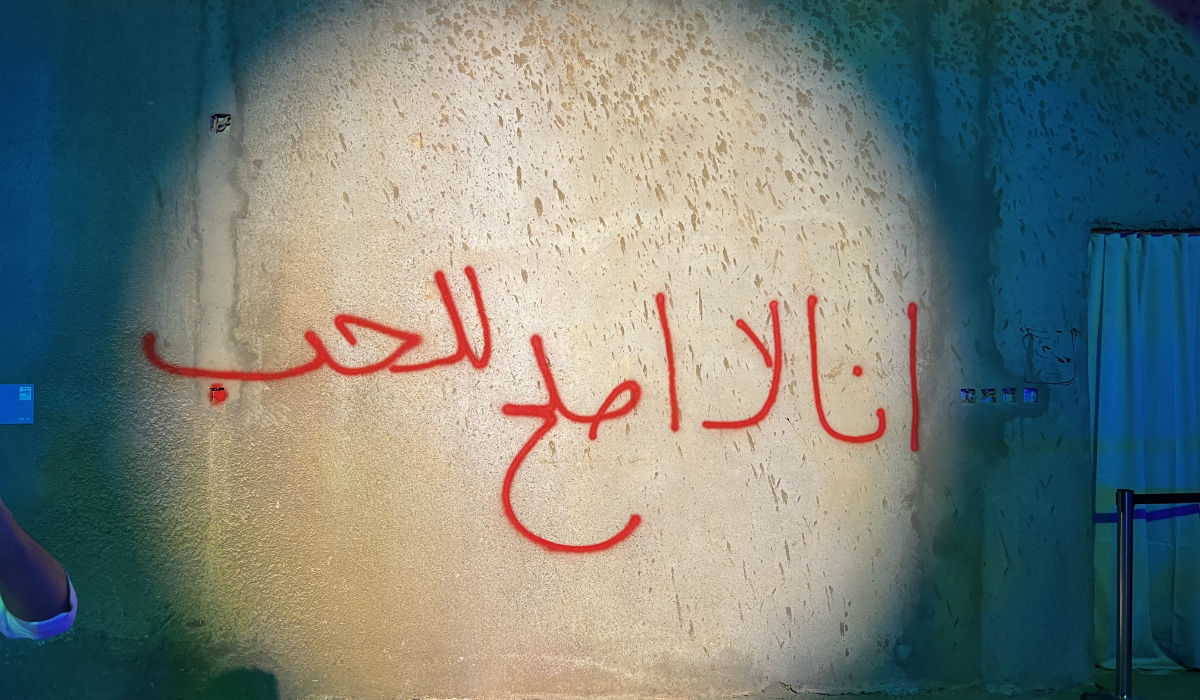
Graffiti work by Saudi artist Moath Alofi. (AN photo)
As the festival champions collaboration, collectiveness, and knowledge exchange, the halls of the abandoned building echo with discourse circles, music, and the rattles and hisses of spray cans.
The Art of the People Area buzzes with visitors looking to unleash their creative expression with various materials, including paint and non-toxic chalk, on the building’s walls. By the end of the fest, the concrete will become a collective artwork. The zone is open to all, daily from 7 p.m. to 9 p.m.
Al-Mahoozi said: “We used to dream of something like this happening. Street art or graffiti used to be forbidden, and today artists are acknowledged and asked to present work to the community by the Visual Arts Commission.”

















